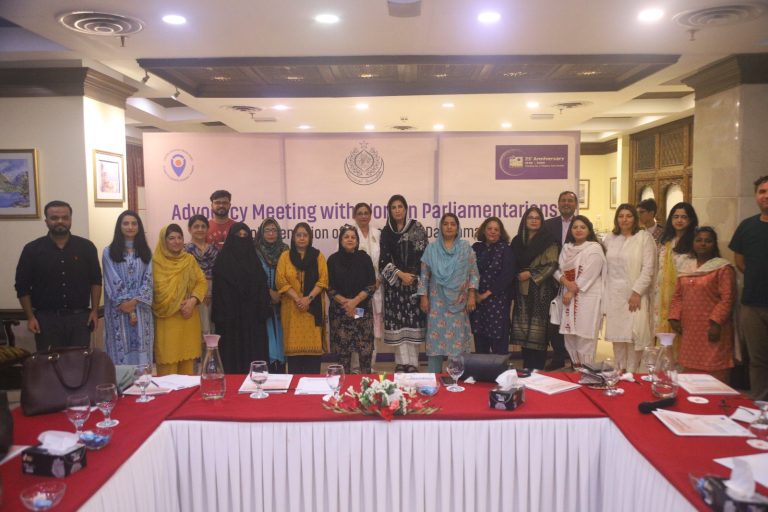
Survivors of Gender-Based Violence often face significant challenges even after escaping the immediate danger and seeking refuge in shelters
Karachi
Rozan, a non-government organization, in collaboration with the Women Development Department Sindh is implementing a project titled “Improving post-shelter lives of women survivors of violence” in two districts of Sindh – Hyderabad and Sukkur.
Gender-Based violence remains a critical global issue, affecting millions of women worldwide. Survivors of Gender-Based Violence (GBV) often face significant challenges even after escaping the immediate danger and seeking refuge in shelters.
Speaking at an advocacy meeting on Tuesday September 12, 2023, with Women Parliamentarians for Implementation of the Post-Shelter Socio-Economic Integration Policy for Dar-ul-Amans, Syeda Shahla Raza, former Minister Women Development Department, Sindh, stated that stigmatization of the women survivors of violence is one of the major challenges that women face in their post-shelter life. We will contribute to the implementation of the policy at all levels.
Advocacy Meeting with Women Parliamentarians for Implementation of the Post Shelter Socio-Economic Integration Policy for Dar-ul-Amans was concluded on Tuesday.
This policy mainly covers all the crucial steps needed to support women survivors of GBV in their journey towards rebuilding their lives after seeking shelter. This Policy has been developed to improve post-shelter social and economic integration services for women survivors of violence seeking refuge at the Dar-ul-Amans (DuAs) across Sindh. It focuses on key service delivery areas within the shelters that have been shown to lead to improvements in women’s lives after discharge. It identifies key domains of concentrated interventions, the basic principles behind them, and related procedures for survivor-centered service delivery.
During the presentation of the objectives of the meeting, Madeeha Waheed Program Manager of Women’s Program, Rozan elaborated on the organization’s experience of working with Darulamans and other government and private shelters during the last 25 years. She also shared the achievements of the 3-year project implemented in collaboration with the Women Development Department.
Ms. Madeeha added that we want to generate a discussion on the possible approaches, strategies, and best practices that can be utilized for supporting the Women Development Department in the implementation of the policy.
Also read: 2,777 Cases of Domestic Violence against Women in Pakistan’s Sindh
Women Development Department Sindh has launched a “Policy on Post Shelter Socio-Economic Integration of Women Survivors of Violence”. The overall objective of this Policy is to strengthen the social and economic rehabilitation and (re)integration services and programs for women seeking shelter from gender-based violence, abuse, and exploitation in the province of Sindh. It seeks to expand support to not only women’s shelter residents but also former residents for their empowerment and prevention of violence and abuse in their post-shelter lives. It lays down priority actions related to education and skills; economic activity; legal rights; healthcare; childcare and support; safety and security; safe housing; social networks’ expansion, community support, and acceptance, which have been determined as key areas requiring concerted focus by all concerned stakeholders inputting into this policy.
Introducing the policy, Fouzia Yasmin Deputy Director Programs Rozan shared the process and steps involved in the development of the policy. She also explained the major domains of the policy including Education, skills acquisition, economic independence, legal rights and safeguarding survivor’s best interest, health care, Childcare, support and protection, safe housing and alternate accommodation and social support networks.
The Policy rests on eight main domains of interventions to be implemented by WDD staff with support from its allied agencies and partners. Within these domains, Key Actions are built on 8 distinct but interconnected strategies, including Assessments; Interventions; Follow-up; Capacity-building; Documentation; Networking; Referrals and Community Engagement.
The advocacy meeting will have the following key objectives:
Share and highlight the support required from the women parliamentarians for the implementation of the post shelter policy, discuss the possible approaches, strategies, and best practices that can be utilized for supporting the WDD in the implementation of the policy, seek support from the women parliamentarians for advocacy not only within their political parties and parliamentary committees but also in resource allocation within their relevant departments.
Ms. Nuzhat Sherin (Chairperson, PCSW) said that this is a comprehensive policy that covers almost all important aspects of the post-shelter phase of a survivor. She also stressed on role of the commission as well.
The purpose of the advocacy meeting is to engage practitioners, advocates, and subject experts from government and non-government sectors in Sindh (as well as other provinces), who are or have been involved with shelters in their line of work/study. Participants/Parliamentarians in the consultation are expected to provide clarity, guidance and inputs related to key problems (as well as discuss sector-wide policies, practices, challenges, and opportunities to link up different stakeholders, and ultimately strengthen post-shelter social and economic (re)integration/ rehabilitation of women in Sindh.
Ms. Mangla Sharma appreciated and committed to advocating for the implementation of the policy.
It is hoped that the implementation of this policy will assist women, survivors of violence, in the pursuit of social & economic justice and encourage them to break the cycle of abuse. It is also hoped that this policy will ultimately contribute towards violence against women mitigation and prevention in Sindh. Hence, this advocacy meeting will play an important role to not only support the mandate of WDD but ultimately provide relief to the survivors of GBV and help them to live a dignified life. (PR)
_____________